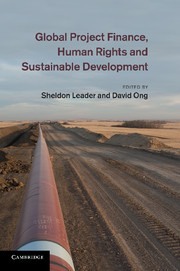Description
Global Project Finance, Human Rights and Sustainable Development
Coordinators: Leader Sheldon, Ong David
What are the implications of project finance for human rights and sustainable development?
Language: English
Global Project Finance, Human Rights and Sustainable Development
Publication date: 09-2013
Support: Print on demand
Publication date: 09-2013
Support: Print on demand
Global project finance, human rights and sustainable development
Publication date: 08-2011
534 p. · 15.7x23.5 cm · Hardback
Publication date: 08-2011
534 p. · 15.7x23.5 cm · Hardback
Description
/li>Contents
/li>Biography
/li>
Many infrastructure projects around the world are funded through the project finance method, which combines private financing with public sector backing from multilateral finance institutions such as the World Bank. This examination of the theoretical and practical implications of such funding begins with a discussion of the relationship between the financial structuring of these projects and finance, policy and legal disciplines, especially in the form of investment law, human rights and environmental law. A number of case studies are then examined to provide practical insights into the application (or otherwise) of human rights and sustainable development objectives within such projects. While these theoretical perspectives do not conclude that the project finance method detracts from the application or implementation of human rights and sustainable development objectives, they do highlight the potential for the prioritisation of investment returns at the expense of human rights and environmental protection standards.
Part I. The Framework: 1. An introduction to the issues Sheldon Leader; 2. The linkages between project finance and sustainable development Annie Dufey and Maryanne Grieg-Gran; 3. Project finance and the relevant human rights Ozgur Can Kahale; 4. Applying international environmental principles within project-financed transnational investment agreements David M. Ong; Part II. Special Topics: 5. Risk management, project finance, and rights-based development Sheldon Leader; 6. Freezing the balancing act?: Project finance, legal tools to manage regulatory risk, and sustainable development Lorenzo Cotula; 7. Human rights impact assessments and project finance Tamara Wiher; 8. Project finance investments and political risk: an empirical investigation Claudia Girardone and Stuart Snaith; 9. Insurance as a risk management tool: a mitigator or an aggravant? Rasmiya Kazimova; 10. Irreparable damages, project finance and access to remedies by third parties Judith Schönsteiner; Part III. Case Studies: 11. The implications of the Chad-Cameroon and Sakhalin transnational investment agreements for the application of international environmental principles David M. Ong; 12. The human rights and sustainable development implications of the project finance arrangements for the Baku-Tbilisi-Ceyhan (BTC) pipeline project Annie Dufey with contribution from Rasmiya Kazimova; 13. The Orion and CMB pulp plants in Uruguay Annie Dufey with contribution from Diana Morales; 14. The Newmont and Anglogold mining projects Nii Ashie Kotey and Poku Adusei; 15. Overview and recommendations Sheldon Leader and Rasmiya Kazimova.
Sheldon L. Leader is Professor in the School of Law, University of Essex and Director of the Essex Business and Human Rights Project. He works at the intersection between human rights law, areas of law governing economic actors, and legal theory. He has focused on the human rights impact of investment strategies, most recently in Kosovo working with the Organization for Security and Cooperation in Europe (OSCE).
David M. Ong is a Reader at the University of Essex Law School, UK where he teaches and researches in the fields of Public International Law and Environmental Law. He has served as a technical expert and resource person for United Nations Development Programme (UNDP) activities on Oil- and Gas-Producing Developing Countries, as well as the Organization for Security and Co-operation in Europe (OSCE) Mission in Kosovo, alongside Professor Leader.
David M. Ong is a Reader at the University of Essex Law School, UK where he teaches and researches in the fields of Public International Law and Environmental Law. He has served as a technical expert and resource person for United Nations Development Programme (UNDP) activities on Oil- and Gas-Producing Developing Countries, as well as the Organization for Security and Co-operation in Europe (OSCE) Mission in Kosovo, alongside Professor Leader.
© 2024 LAVOISIER S.A.S.




